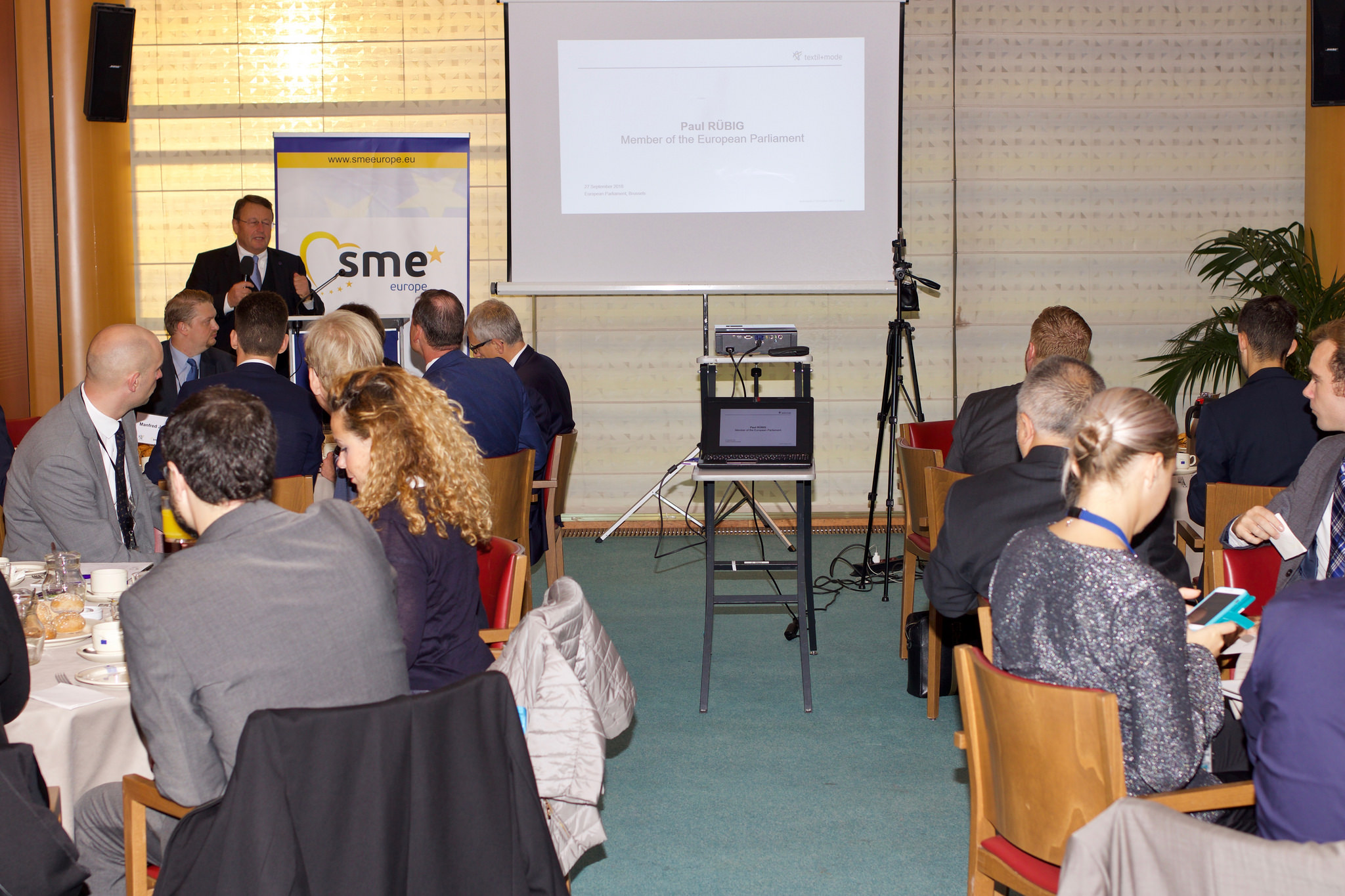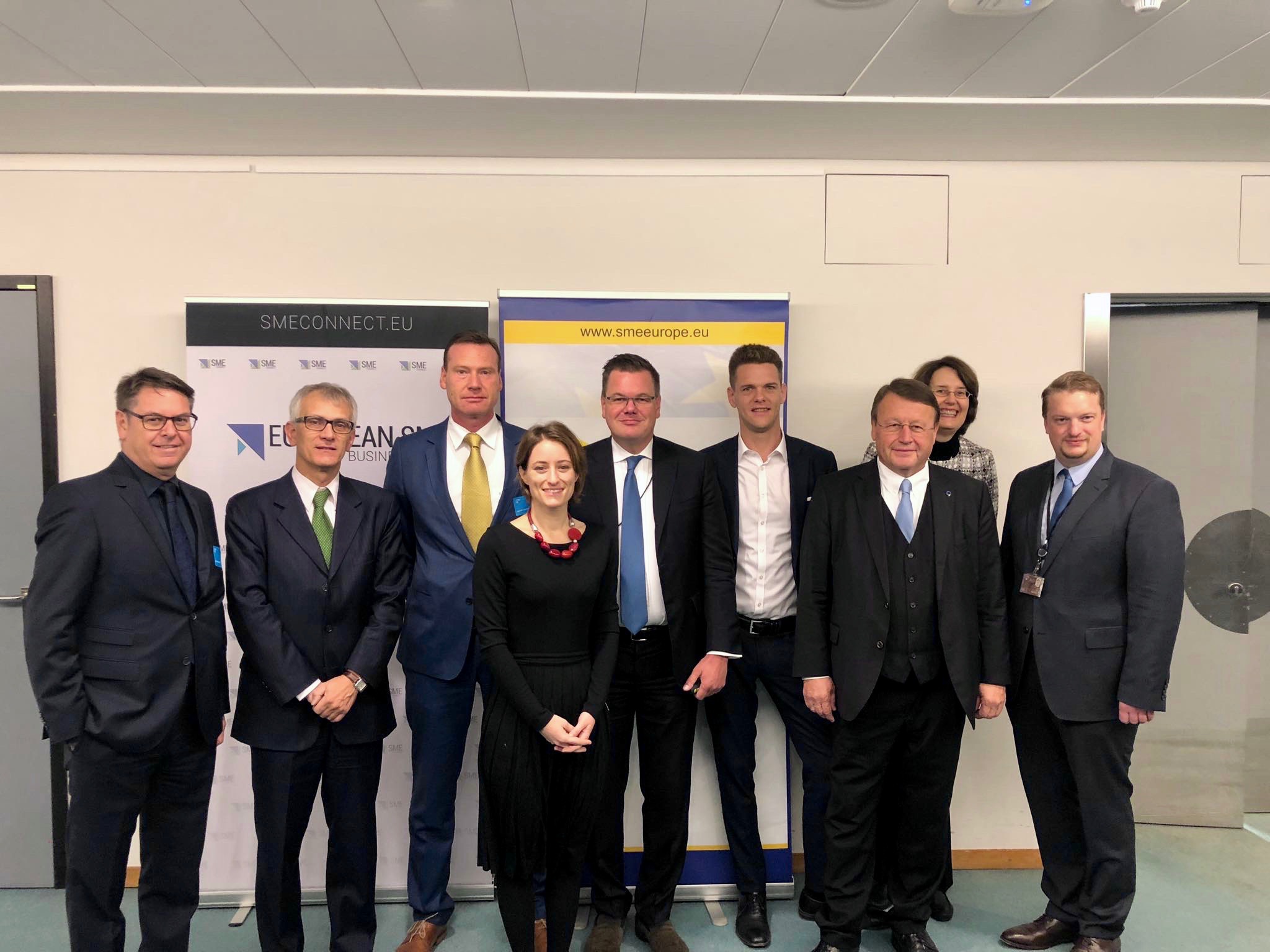EU Free Trade Agreements: The Best Deal for Innovative Industries – New Opportunities for European Textile & Fashion
On September 27th SME Europe and SME Connect hosted a Working Breakfast in the European Parliament on the topic: “EU Free Trade Agreements: The Best Deal for Innovative Industries- New Opportunities for European Textile and Fashion“
The event featured the following speakers and moderators: Dr. Paul RÜBIG MEP, Member of the Committee on Industry, Research and Energy, Honourable President of SME Europe, President SME Global; Ralph KAMPHÖNER, Head of Brussels Office & Head Foreign Trade, Confederation of the German Textile and Fashion Industry (textil+mode); Sandra GALLINA, Deputy Director General of DG Trade, European Commission; Christofer FJELLNER MEP, Member of the Committee on International Trade; Eleonora CATELLA, Senior Adviser, Businesseurope; Alberto MAZZOLA, Employers Group at European Economic and Social Committee; Henric LEUER,Managing Director, Verseidag AG, Manfred JUNKERT, Deputy Director, Confederation of the German Textile and Fashion Industry (textil+mode) The Working Breakfast in the European Parliament was moderated by Dr. Horst Heitz, Executive Director of SME Europe of the EPP and by Ralph Kamphöner, Head of Brussels Office & Head Foreign Trade, Confederation of the German Textile and Fashion Industry (textil+mode)

Starting with a welcome speech by Dr. Paul Rübig, in which he stated that we have to work stronger together in the context of Free Trade on a European and Global level with parliamentarians and public. Free trade has not only positive impacts on country’s economy but also on people’s lives, in terms of lower prices, higher quality, better wages, and higher buying power. It is overall a win-win situation for all, which leads to the dimension of freedom and diversity. In addition, Dr Rübig emphasizes the need of more bi- and multilateral agreements in order to compete globally in the growing sector of e-Commerce.
Henric Leuer introduced the activities and philosophy the company Verseidag AG, which produces innovative, high-quality, coated ‘technical textiles’. Verseidag products can be found in many highly demanding application markets such as textile architecture, large tents, large-format digital printing, biogas, bullet-proof vests, and other industry solutions. To maintain the competitiveness and innovation, Verseidag invests 1,2% of its turnover in R&D cooperating with institutes of universities. Verseidag concentrates also in environment-friendly production and product. The longer lasting, lighter and wider the fabric the better. Verseidag is pleased by contracts in the US, Middle East, and Asia, where they are linked economically/Commercially and with the authorities. Therefore, Verseidag is very keen on free trade agreements and supports any approach.
Sandra Gallina gave her impulse statement by saying that the textile sector has been deeply reshaped. The European Commission has different ways of tackling agreements. Firstly, one must understand what is put in an agreement and how to implement it in the market. There are many barriers that must be removed in the first place before accessing a market. However, SMEs are not informed about changes, therefore Ms. Gallina claims for a more proactive information supply. Furthermore, she pleads for provisions which facilitate SMEs action to export in other countries. Nonetheless, in the end it will again be a matter of opportunity cost. After Ms. Gallina explained the working process of the Commission for FTAs, she emphasized the need of rules of origin which is harmonized.
A candle never shines as brightly as it does in the complete darkness, so it is with trade policy.
Christofer Fjellner related to his work process in free trade and emphasized its more and more important in a globalized world. Where at the beginning people tend to persist for loyalty for WTO, now the European policy has improved and changed to a large extent. It is also important to enhance the possibility to import what we need in order to export what we can. In Mr. Fjellner’s opinion, the commission has an ambitious agenda, which will be accomplished piece by piece despite the staff shortage. New free trade discussion has mostly started with skepticisms towards other countries and culture, e.g. Japan, however, one will see now how important it is to have more bilateral agreements. Unfortunately, this discussion is often postponed or more sanctions are added to environmental and social issues.
With her speech, Eleonora Catella supported bi- and multilateral free trade agreements in order to gain more competitiveness and growth in Europe. The textile and fashion industry is a very innovative sector, which also plays a big part in the technical and medical field. Many companies invest a lot in R&D for new products on the market. Furthermore, Ms. Catella claims that we need to change/enhance perception regarding intellectual property and rules of origin to provide solutions to businesses and protect their ideas.
The working breakfast was closed by the remarks of Alberto Mazzola. More problems occurred with CETA than it is approved by the agreement itself. Therefore, the Commission proposed a domestic advisory group. In the free trade discussion with many countries arises pressure from all organizations. It is important to look at this FTA matter in different angles of all parties concerned. Alberto Mazzola urges for stronger cooperation and dialogues with all stakeholders.
